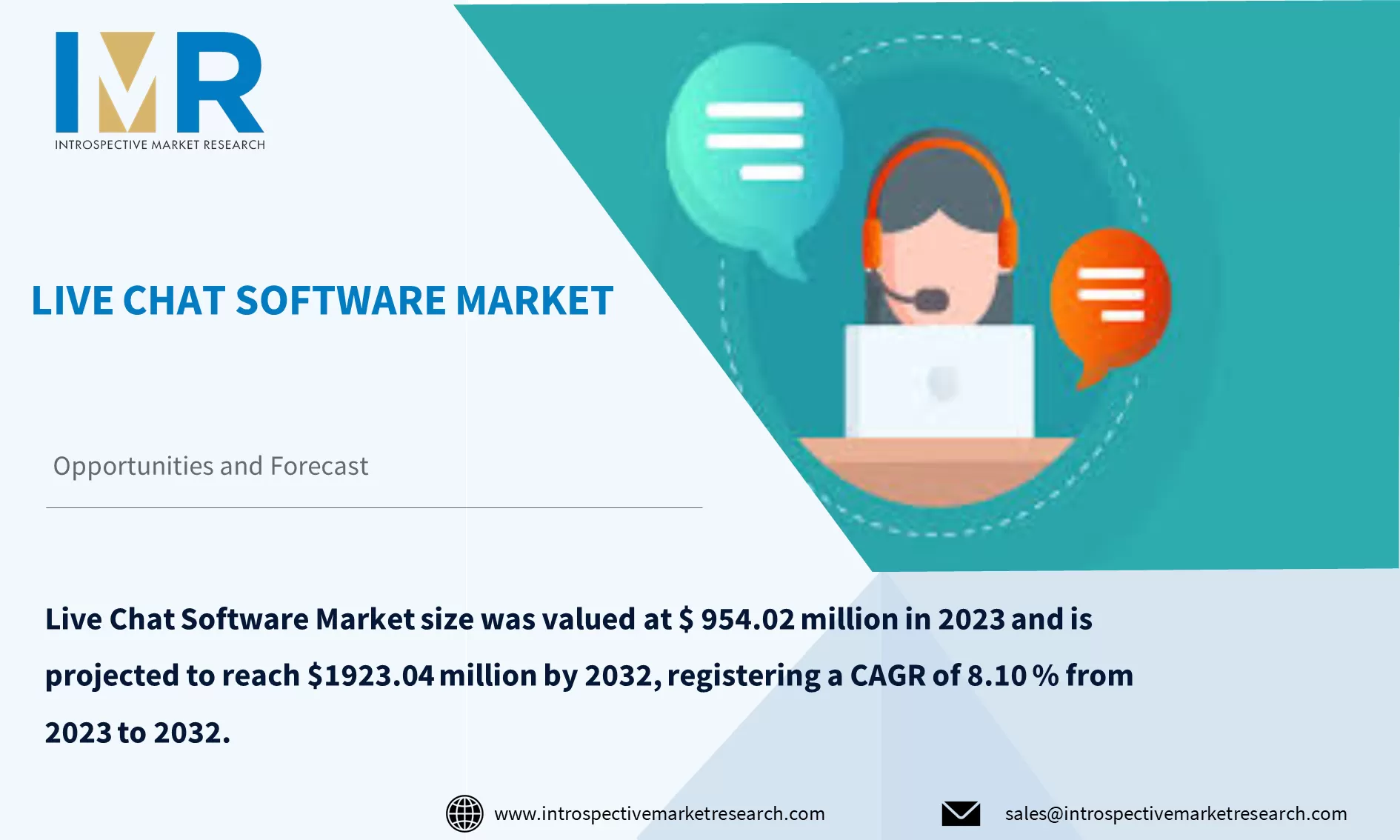Live Chat Software Market Synopsis
The global Live Chat Software Market size was valued at $ 954.02 million in 2023 and is projected to reach $1923.04 million by 2032, registering a CAGR of 8.10 % from 2023 to 2032.
Live chat software is a type of service that allows instant and fast customer support and information. It works like an instant message where customers can interact in real time. Live chat support can quickly and conveniently answer customer questions that can improve a company's homepage. In this fast-paced digital age, customers want convenience and quick results. Therefore, adapting to this dynamic environment and trend and providing fast and quick solutions differentiates end users from their competitors. Most industry research shows that customers value timely and accessible support.
Integrating live chat into websites is becoming increasingly common across industries. Its purpose is to provide quick responses to customers and thereby improve sales and promote customer loyalty to the organization. In addition to shopping platforms such as travel and hospitality, education, medical professionals, automotive, real estate, IT solution providers, airlines, and web hosting companies are actively using it as an integral part of their daily operations.
Live chat software is a valuable tool for businesses to improve customer engagement and communication. It has an average response time of 23 seconds, which reduces wait times and increases sales. It is cost-effective, 17-30% cheaper than phone calls and Live chat solves the customer's pain points with individual solutions and quick access to offers or product inquiries. This prevents 42 percent of American consumers from abandoning an online purchase due to late responses. It also improves customer satisfaction by 90% and expands market reach by facilitating the communication of international customers.
Live chat satisfaction is 73% across all customer service channels. It gets the highest rating compared to email at 61% and phone at 44%. Additionally, the American Marketing Association found that B2B companies using live chat saw an average 20% increase in conversions. In a separate Forbes survey, 92% of customers are satisfied with live chat compared to other communication channels such as voice (88%), email (85%), and online form (85%). Meanwhile, social media platforms such as Facebook and Twitter received 84 % and 77 % respectively.
Global Live Chat Software Market, Segmentation
The Live Chat Software Market is segmented based on product, Type, End-user, Device Type, and Region.
Type:
The System type segment is further classified into Customer Service Live Chat Systems and Informational Service Live Chat Systems. Among these, the Live Chat systems sub-segment accounted for the highest market share in 2023
These systems offer a wide range of services from initial design and installation to ongoing training, troubleshooting, maintenance, upgrades, and product removal. They guide customers through installation processes, address technical issues, provide product training, and help dispose of obsolete equipment in an environmentally friendly manner.
Customer Service Live chat software ranges from troubleshooting to proactive engagement and personal assistance. Companies can improve the overall customer experience by providing timely and tailored guidance. This includes providing service reminders, recommending product updates based on usage patterns, and real-time troubleshooting. Live chat software helps businesses build stronger customer relationships, foster loyalty, and increase long-term satisfaction and retention. Essentially, live chat systems are the cornerstone of modern customer support strategies, enabling companies to provide exceptional service and support throughout the customer journey.
End User:
In e-commerce, using live chat software seems to be the most important strategy for getting instant customer support. With the rapid expansion of e-commerce, the integration of live chat technology has become central to enriching the shopping journey. This innovative tool significantly improves the customer experience by quickly answering product questions, supporting order processing, and quickly resolving potential issues in real-time.
The spread of chat applications and the emergence of social commerce has accelerated the use of chatbots in online shopping platforms. These smart assistants play an important role in facilitating smooth transactions, providing personalized product recommendations, and efficient customer support services. By seamlessly integrating live chat software into their e-commerce infrastructure, businesses can streamline communication channels, increasing customer engagement, trust, and satisfaction. This promotes sales growth and develops sustainable and fruitful customer relationships.
Region:
North America is expected to dominate the market during the forecast period. The United States dominates the live chat software market due to various factors such as the adoption of advanced technology, increasing demand for live chat software, strong economic growth, large business base, increasing demand for better customer experience, and beneficial government policies later. North America's leading startup accelerators create and develop tools and software enabled by artificial intelligence (AI) to support companies in customer service, sales, and marketing.
The adoption of live chat in the US is driven by factors such as the need for real-time customer support, the growing popularity of digital communication channels, and the desire to improve customer engagement and satisfaction. This market is expected to benefit greatly from the combination of AI and live chat software.
Some of The Leading/Active Market Players Are-
- LiveChat, Inc. (U.S.)
- Intercom (U.S.)
- Zendesk (U.S.)
- Freshworks Inc. (U.S.)
- Drift (U.S.)
- HelpCrunch (U.S.)
- LivePerson, Inc. (U.S.)
- Olark (U.S.)
- HappyFox Inc. (U.S.)
- Chatra (U.S.) and Other Active Players.
Key Industry Developments
- In January 2024, Freshworks Announces Strategic Partnership Agreement with AWS to Expand Coverage of AI-Enhanced Software as a Service. Freshworks Inc. announced today that it has entered into a multi-year strategic collaboration agreement (SCA) with Amazon Web Services (AWS) to develop and expand Freshworks' AWS capabilities.
- In March 2024, Zendesk acquires Ultimate. Zendesk announced the acquisition of Ultimate, an industry-leading service automation provider, to deliver the market's most complete artificial intelligence for customer experience (CX)1. As unprecedented demand for AI accelerates and deepens customer engagement, AI agents are moving beyond traditional robotic capabilities to help brands turn CX into a competitive advantage.
Key Findings of the Study
- In particular, the e-commerce sector benefits from live chat technology that provides instant customer support, facilitates order processing and real-time problem solving that enriches the shopping experience and increases sales.
- North America, especially the US, dominates the live chat software market due to the adoption of advanced technology, growing demand for better customer experiences, and a strong business foundation. The integration of artificial intelligence is believed to accelerate growth.
- Customer satisfaction with live chat surpasses other communication channels such as email and phone, and B2B companies have seen a significant 20% increase in conversions, highlighting its effectiveness in driving sales and positive customer experiences.






